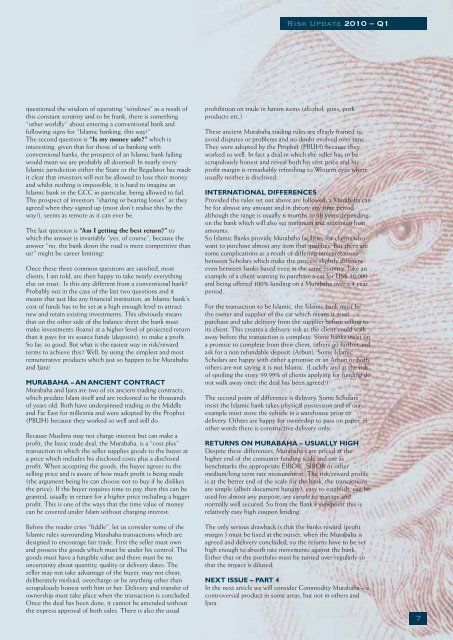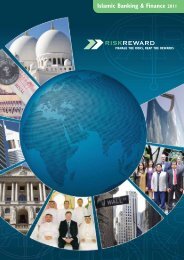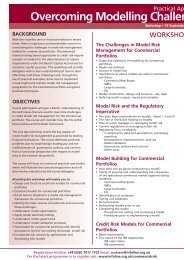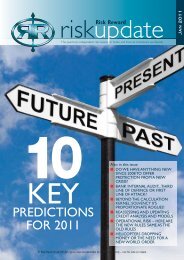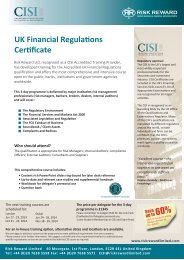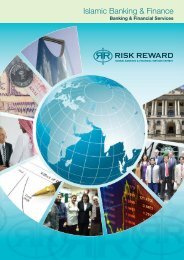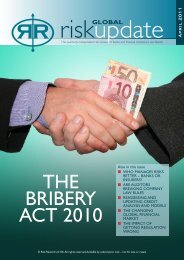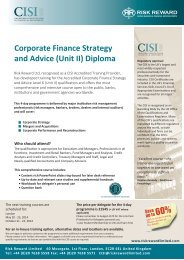You also want an ePaper? Increase the reach of your titles
YUMPU automatically turns print PDFs into web optimized ePapers that Google loves.
<strong>Risk</strong> Update 2010 – Q1questioned the wisdom of operating “windows” as a result ofthis constant scrutiny and to be frank, there is something“other worldly” about entering a conventional bank andfollowing signs for “<strong>Islamic</strong> banking, this way!”The second question is “Is my money safe?” which isinteresting, given that for those of us banking withconventional banks, the prospect of an <strong>Islamic</strong> bank failingwould mean we are probably all doomed! In nearly every<strong>Islamic</strong> jurisdiction either the State or the Regulator has madeit clear that investors will not be allowed to lose their moneyand whilst nothing is impossible, it is hard to imagine an<strong>Islamic</strong> bank in the GCC in particular, being allowed to fail.The prospect of investors “sharing or bearing losses” as theyagreed when they signed up (most don’t realise this by theway!), seems as remote as it can ever be.The last question is “Am I getting the best return?” towhich the answer is invariably “yes, of course”, because theanswer “no, the bank down the road is more competitive thanus!” might be career limiting!Once these three common questions are satisfied, mostclients, I am told, are then happy to take nearly everythingelse on trust. Is this any different from a conventional bank?Probably not in the case of the last two questions and itmeans that just like any financial institution, an <strong>Islamic</strong> bank’scost of funds has to be set at a high enough level to attractnew and retain existing investments. This obviously meansthat on the other side of the balance sheet the bank mustmake investments (loans) at a higher level of projected returnthan it pays for its source funds (deposits), to make a profit.So far, so good. But what is the easiest way in risk/rewardterms to achieve this? Well, by using the simplest and mostremunerative products which just so happen to be Murabahaand Ijara!MURABAHA – AN ANCIENT CONTRACTMurabaha and Ijara are two of six ancient trading contracts,which predate Islam itself and are reckoned to be thousandsof years old. Both have underpinned trading in the Middleand Far East for millennia and were adopted by the Prophet(PBUH) because they worked so well and still do.Because Muslims may not charge interest but can make aprofit, the basic trade deal, the Murabaha, is a “cost plus”transaction in which the seller supplies goods to the buyer ata price which includes his disclosed costs plus a disclosedprofit. When accepting the goods, the buyer agrees to theselling price and is aware of how much profit is being made(the argument being he can choose not to buy if he dislikesthe price). If the buyer requires time to pay, then this can begranted, usually in return for a higher price including a biggerprofit. This is one of the ways that the time value of moneycan be covered under Islam without charging interest.Before the reader cries “fiddle”, let us consider some of the<strong>Islamic</strong> rules surrounding Murabaha transactions which aredesigned to encourage fair trade. First the seller must ownand possess the goods which must be under his control. Thegoods must have a fungible value and there must be nouncertainty about quantity, quality or delivery dates. Theseller may not take advantage of the buyer, may not cheat,deliberately mislead, overcharge or be anything other thanscrupulously honest with him or her. Delivery and transfer ofownership must take place when the transaction is concluded.Once the deal has been done, it cannot be amended withoutthe express approval of both sides. There is also the usualprohibition on trade in haram items (alcohol, guns, porkproducts etc.)These ancient Murabaha trading rules are clearly framed toavoid disputes or problems and no doubt evolved over time.They were adopted by the Prophet (PBUH) because theyworked so well. In fact a deal in which the seller has to bescrupulously honest and reveal both his cost price and hisprofit margin is remarkably refreshing to Western eyes whereusually neither is disclosed.INTERNATIONAL DIFFERENCESProvided the rules set out above are followed, a Murabaha canbe for almost any amount and in theory any time periodalthough the range is usually 6 months to 10 years dependingon the bank which will also set minimum and maximum loanamounts.So <strong>Islamic</strong> Banks provide Murabaha facilities for clients whowant to purchase almost any item that qualifies. But there aresome complications as a result of differing interpretationsbetween Scholars which make the process slightly differenteven between banks based even in the same country. Take anexample of a client wanting to purchase a car for US$ 30,000and being offered 100% funding on a Murabaha over a 4 yearperiod.For the transaction to be <strong>Islamic</strong>, the <strong>Islamic</strong> bank must bethe owner and supplier of the car which means it mustpurchase and take delivery from the supplier before selling toits client. This creates a delivery risk as the client could walkaway before the transaction is complete. Some banks insist ona promise to complete from their client, others go further andask for a non refundable deposit (Arbun). Some <strong>Islamic</strong>Scholars are happy with either a promise or an Arbun or both,others are not saying it is not <strong>Islamic</strong>. (Luckily and at the riskof spoiling the story 99.99% of clients applying for funding donot walk away once the deal has been agreed!)The second point of difference is delivery. Some Scholarsinsist the <strong>Islamic</strong> bank takes physical possession and in ourexample must store the vehicle in a warehouse prior todelivery. Others are happy for ownership to pass on paper, inother words there is constructive delivery only.RETURNS ON MURABAHA – USUALLY HIGHDespite these differences, Murabaha s are priced at thehigher end of the consumer funding scale and use asbenchmarks the appropriate EIBOR, SIBOR or othermedium/long term rate measurement. The risk/reward profileis at the better end of the scale for the bank, the transactionsare simple (albeit document hungry), easy to establish, can beused for almost any purpose, are simple to manage andnormally well secured. So from the Bank’s viewpoint this isrelatively easy high coupon lending.The only serious drawback is that the banks reward (profitmargin ) must be fixed at the outset, when the Murabaha isagreed and delivery concluded, so the returns have to be sethigh enough to absorb rate movements against the bank.Either that or the portfolio must be turned over regularly sothat the impact is diluted.NEXT ISSUE – PART 4In the next article we will consider Commodity Murabaha – acontroversial product in some areas, but not in others andIjara.7


